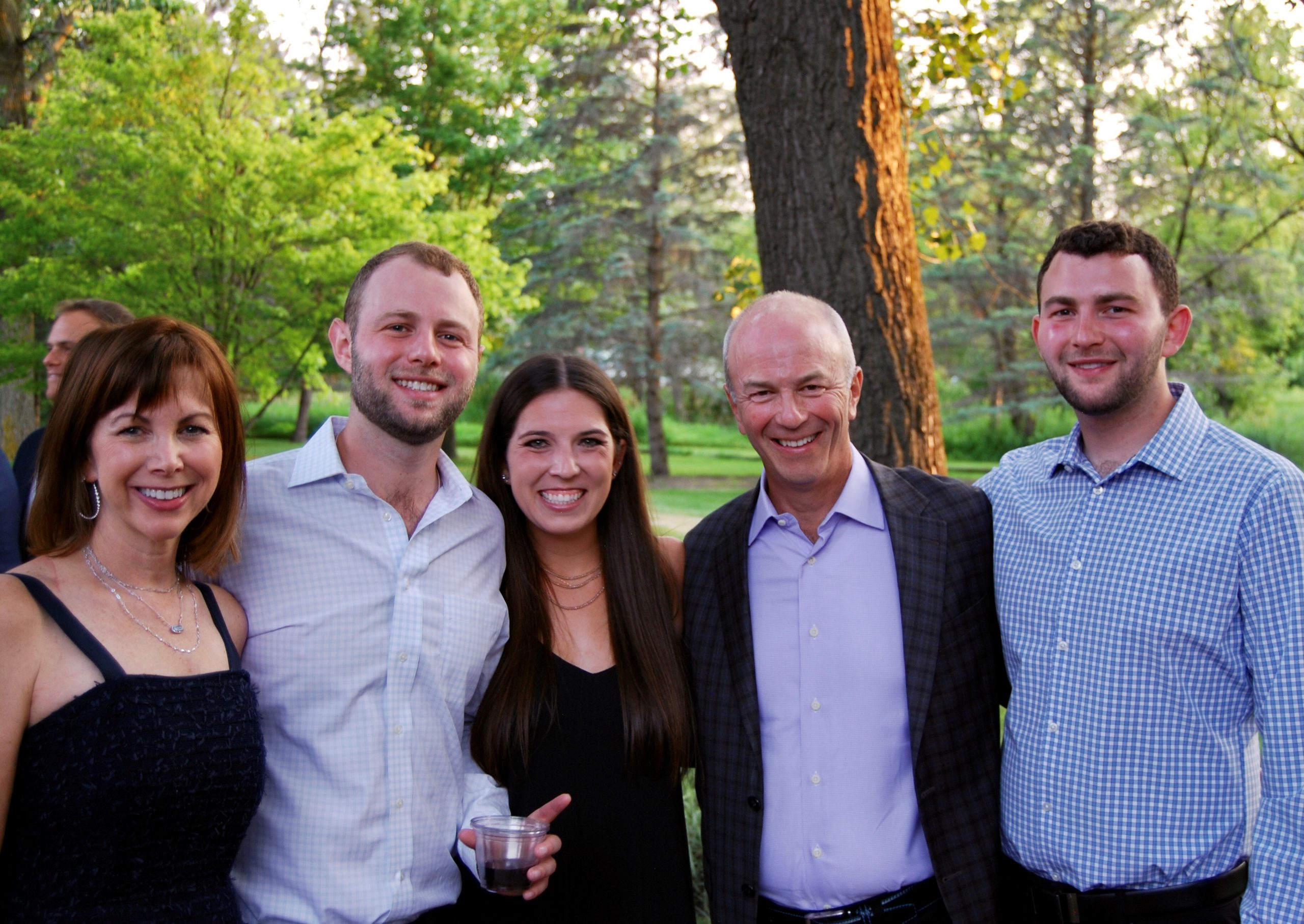
I know that I am fortunate in many ways. Among the reasons for that good fortune is that I have never worried about money. That’s partly because I’m just not a worrier by nature, and I don’t get stressed very easily. Actually, I’ve always been a glass-half-full kind of guy and have always had the confidence that whatever curve balls come my way, I’ll figure it out.
When it comes to my family’s finances, I can point to two things that got us headed in the right direction. First, neither my wife Laurie nor I entered the working world with any debt. While Laurie paid for a portion of her college education, my parents paid for my college and graduate school in full. The only exception was my spending money, which involved walking over to the student union most Friday afternoons and standing in line to cash a hand-written $25 check – which was easy for me to cover with my earnings from summer jobs.
The second is that from the time Laurie and I got married a year or so after college, we had this innate sense that we needed to spend far less than we made. I don’t recall ever discussing how much we could or should spend, and to this day, we have never had a household budget. It was just natural to us both that we needed to live within our means. We both had good-paying jobs in public accounting, and even in those early years, we had a soft goal of saving one of our paychecks. Reflecting all these years later, those types of decisions got us off to a strong financial footing that continues to this day.
Over the years, of course, we put money aside for specific items, including our first condo in Evanston, our house in Deerfield, and most recently, a second home in Scottsdale. We also created college savings accounts for our boys. As it turns out – because they wisely chose to follow our footsteps to the University of Illinois – the cost of their education was relatively reasonable. So we were able to pay those expenses out of pocket and give them a small head start on their own financial future. Even better, we are extremely proud that they, too, have good jobs and have adopted the same financial mindset that Laurie and I had at their age.
Everything we saved beyond the dollars earmarked for homes and education went into the long-term savings bucket, which (finally) brings me around to how we actually invest our money.
When it comes to investing, I like to think that my perspective concerning my own wealth helps me be a better advisor to our clients. The reality is that this perspective is rooted in both real-world experience and academic research into what works and what doesn’t. It’s not rocket science, and for decades now, I’ve been an ardent believer in some basic tenets:
Asset allocation is the most important determinant of investment success. Our allocation has changed a bit over the years as our circumstances have changed, and today we have a target allocation of 30% to bonds, 35% to stocks, and 35% to alternative investments. Now my allocation may be a little different than yours, even if you and I have similar circumstances. There could be many reasons for that, and that’s ok – I do not believe there is a single right answer when it comes to asset allocation. Sure, there are ways to purportedly “optimize” an allocation, but I believe this stuff should be as much art as science. Simply put, this allocation works for us.
Know your appetite/tolerance for risk. Laurie and I have a reasonably high tolerance for risk. To be sure, part of the reason for that is that we have more than we need. But it’s also because of the next point below.
Don’t look too closely or too often. We don’t obsess over the daily swings in our portfolio or net worth. I calculate our net worth twice a year, and I check my own portfolio at most quarterly. There are days when I’m busy at the office and go home without knowing what the stock market did that day. While that may seem like a bad thing for a wealth manager to admit, the reality is that daily market moves just don’t matter. I’ve written about this before (most recently here and here). I truly believe that if you focus on the long-term, you can and should ignore all the noise.
Timing the market is futile. We don’t try, and I have over thirty years of experience watching others occasionally try. It seldom works, and when it does, it merely emboldens people to try again. One successful call does not make you an expert.
Don’t pick individual securities – instead, manage the managers. Early in my career, I’d pick the occasional stock. Sometimes it worked, sometimes not. I quickly realized that despite my credentials, I’m no expert at this stuff. I can’t possibly compete with the analysts who literally spend all day understanding companies at a level that I can’t possibly duplicate. So I use mostly pooled vehicles like mutual funds, ETFs, limited partnerships, interval funds, and the like.
It’s hard to beat the market. Not impossible, but pretty tough to do so consistently. For my own equity portfolio, I’m heavily skewed towards indexing. I’m not suggesting that active management is a bad idea, but I’ve found that in my own case, I’m happy just getting market-like returns for that piece of my portfolio.
Taxes matter. Managing for after-tax returns is really important, especially in the current world where tax policy is so uncertain. My crystal ball for taxes is no better than the one for predicting the market, but my best guess is that taxes aren’t going down anytime soon. Much of my portfolio is allocated to strategies that either defer or minimize taxes.
Think outside the box. This is a key catch-all and a huge part of our “secret sauce” at Strategic Wealth Partners. We have embraced a thoughtful use of alternative investments since the day we started the firm. As you can see from my target allocation above, I have a good chunk of my assets in a variety of alternatives. I love the idea of finding truly differentiated risk-return opportunities. This is especially important in my particular case because the success of our business is partly tied to the performance of the markets. So finding assets in my portfolio that are less dependent on the markets is helpful.
Looking back at the section above, it seems like a commercial for our firm and the work that we do. Maybe so. But I absolutely believe in every one of these concepts, and they have served Laurie and me extremely well when it comes to our own portfolio.
Finally, a few confessions – things I have done with my own portfolio but wouldn’t recommend to our clients.
First, I have too much cash. It’s all earmarked for fixed-income investments, so I haven’t missed much in today’s environment of paltry interest rates. But I’ve been moving slowly on this and haven’t gotten the cash invested. Fortunately, I have a great team in place to help. My son AJ works with me at SWP and I have entrusted him with keeping my portfolio up to date. He has a plan in place and we’re working together to get it implemented. I guess even a veteran advisor needs an advisor!
Second, too much of my portfolio is in SWP’s publicly traded parent company. Even though I have confidence in the company and its business model, the prudent thing to do is to reduce my exposure slowly, and I have started doing so. This is certainly not a negative comment (or endorsement) of the company, but I just need to be mindful of how much of our net worth is in a single stock and make sure it’s not excessive. This is a common issue for people that receive equity in connection with their work, and we often consult with clients in similar situations.
And finally, I have pursued too many private investment opportunities, things that aren’t appropriate for us to recommend to our clients. I have fun doing it, and the amounts I invest are appropriately modest. But I need to take a more disciplined approach to these going forward.
Overall, I’m very pleased with our portfolio – how it’s allocated, the individual investments we own, how it has performed, etc. It is set up to serve us well into our approaching retirement years, not only to support our lifestyle, but importantly, to help us fulfill our philanthropic objectives and leave a legacy for our family.
My favorite podcast is Guy Raz’s “How I Built This” about entrepreneurs and the businesses they’ve built. At the end of every episode, he asks his guests if their success is the result of luck or due to hard work and good decision-making. I often think about that question myself. When it comes to our financial success, I can honestly say that we are extremely fortunate to have the great foundation that our parents gave us. Still, we’ve also benefitted from working really hard to accumulate what we have and have made some very good decisions along the way.
Giving good advice to our clients so they can make good decisions – it’s why we get up in the morning and (sometimes virtually) go to work. I’m not trying to hit home runs with your portfolio or mine; it’s all about having a great plan, sticking to it, and making adjustments only as needed


